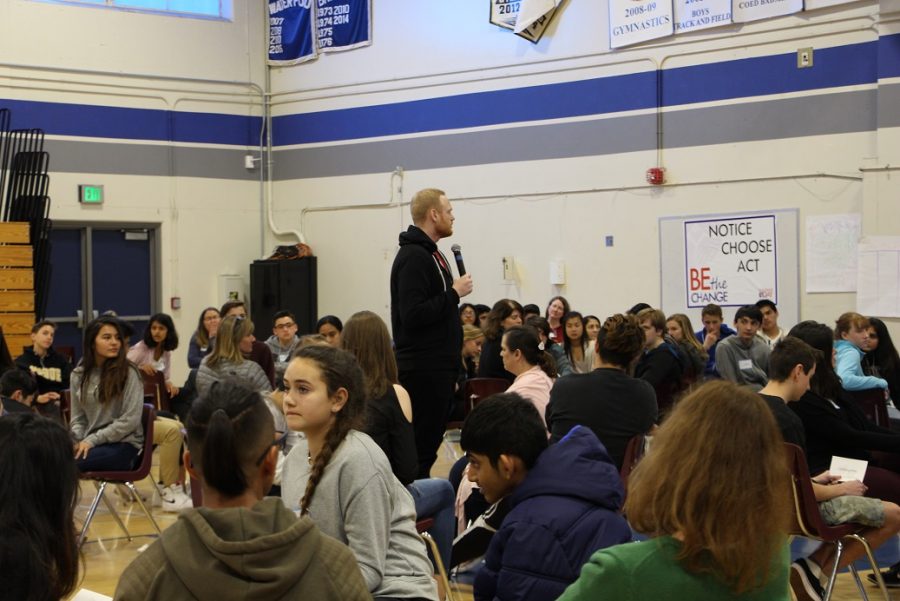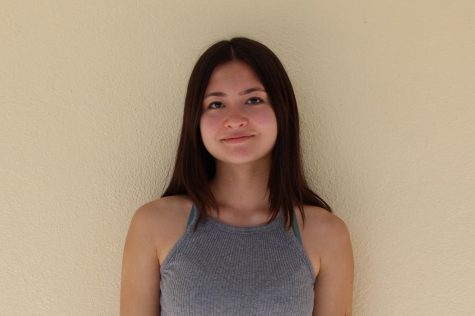Los Altos Pilots Challenge Day Program for Freshmen
“[Challenge Day] started off with us playing silly games, and there was nothing deep or emotional about it,” a Challenge Day parent volunteer said at a PTSA meeting on Tuesday, March 7. “[A few hours later],we were all huddled in small groups listening to [students] talk. By the end of that, I used more Kleenex than the kids.”
Challenge Day was a pilot day-long program designed to promote schoolwide empathy and acceptance through discussions and activities. Created by a company also called Challenge Day, the event occurred on Monday, March 6 in the large gym, and its impacts on its freshman participants, organizers believe, have warranted the continuation of the program in the future.
“The point of Challenge Day… is to show there’s a lot more that we share than we don’t,” Principal Wynne Satterwhite said. “It’s about being more supportive, smiling more and meaning it when you say, ‘How are you?’ It’s about building inner-strength and developing empathy to share that with others.”
Many of the 25 adult volunteers and 100 participating freshmen from teachers Margaret Bennett, Sarah Alvarado and Susana Herrera’s classes reported that the Challenge Day pilot had been a transformative experience. When asked to describe their experience in a survey, students most often used words such as “emotional,” “eye opening” and “inspiring” to describe the day’s events, and 96 percent of students who attended said they believed all ninth graders should experience Challenge Day. One student, freshman Jack Chmyz, says the day helped him create connections with his classmates.
“One of the people in my [small group] was on the soccer team with me, and I feel like I’m closer with him today than I was before,” Jack said. “If we hadn’t had Challenge Day, I wouldn’t have known any of [what I learned] about him, and I kind of feel a special connection to him just because we both opened up to each other about what we truly feel.”
From an adult perspective, the event seemed to cultivate community and have an impact on students. At a PTSA meeting on Tuesday, March 7, parent volunteers praised the event and voiced support for the continuation of the program next year.
“There was a girl apologizing to a kid for teasing them for something,” a parent volunteer said at the PTSA meeting. “I just watched these kids develop empathy for others and they are going to change how they think about talking to each other. It was really powerful, and I was impressed.”
Bennett believes the expertise of the Challenge Day facilitators along with a proven formula for the activities contributed to the program’s success. Progressing from activities such as musical chairs to discussions about issues students see at school, the program’s two facilitators gradually built the day toward more meaningful activities.
“Challenge Day has been around for 30 years, so they know what they’re doing,” Bennett said. “They have outside facilitators that come in who are engaged, connected, enthusiastic and really skilled at what they do [since] they’ve been doing this for a number of years.”
As a result of Challenge Day, Bennett and Alvarado created the “Be the Change” Club on campus. The club is one of the Challenge Day program’s recommendations, and, according to the program’s website, is “about service and giving back to the world.”
At one of its most recent meetings on March 23, the club defined its objectives to be promoting empathy and diversity on campus and helping ease school stress. Bennett and Alvarado hope that after they help get the club running, students will take leadership and decide what specific actions the club will take to better the campus on their own.
“We want it to be student-run, to have students take ownership of how they see the club fitting into what our campus does,” Alvarado said. “During our very first meeting, students identified some issues they want to address on campus. That will help us better define what the goals and missions of the club will be and what types of activities they will take on.”
In terms of future Challenge Days, Bennett and the other organizers hope to plan activities for the entire freshmen class in the coming years. Due to positive response, organizers hope to find ways to tackle logistical challenges such as funding and finding adult volunteers.
“One of the biggest obstacles is finding volunteers, but I think the money can be [found],” Bennett said. “All of the adults thought it was amazing, so… our hope is that their experience will speak to other adults, and maybe they’re willing to take a day off work and come if it’s that impactful of a day.”
Regardless of the logistical obstacles, Bennett believes that future Challenge Days are both feasible and important.
“I think there are logistical [questions], but they are completely surmountable, and I’m excited to see where it goes,” Bennett said. “High school can be this time of images, superficiality and what others think, but what really matters is what we think of ourselves and how we go out and make an impact on the world. Those messages were what students walked away with in such a short amount of time, so that to me is very powerful.”




